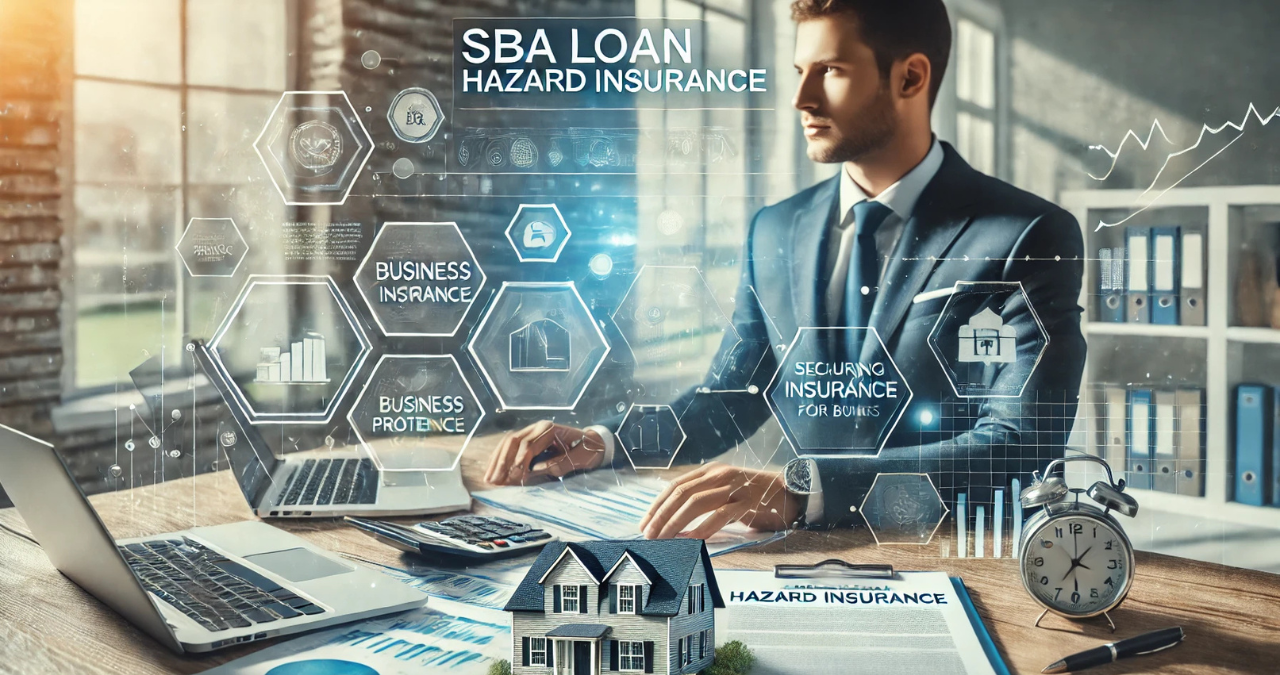When securing an SBA loan for your small business, one of the critical requirements is SBA loan hazard insurance. This insurance protects your company against potential damage or loss that could otherwise jeopardize your ability to repay the loan. SBA loan hazard insurance is essential for safeguarding your business and the lender’s investment. In this article, we’ll explore SBA loan hazard insurance, why it’s required for SBA loans, the steps to obtain it, and the consequences of not having adequate coverage.
What is Hazard Insurance, and Why is it Required for SBA Loans?
SBA loan hazard insurance is a type of property insurance that protects your business from damage caused by specific hazards, such as fire, wind, hail, vandalism, or theft. This insurance covers repairing or replacing damaged property, including buildings, equipment, inventory, and other physical assets vital to your operations.
SBA loan hazard insurance is required for SBA loan recipients to ensure the business’s property is financially protected. The Small Business Administration (SBA) must guarantee that the collateral to secure the loan is safeguarded from unforeseen events. Without adequate insurance, businesses could face severe financial setbacks if a disaster occurs, putting the business owner and the lender at risk.
The SBA requires borrowers to have SBA loan hazard insurance that covers the full replacement value of the insured property, ensuring the business can recover from any damage and continue its operations. SBA-approved lenders may request proof of SBA loan hazard insurance before disbursing loan funds and may require policy updates or additional coverage as part of loan servicing. If you’re borrowing an SBA loan, maintaining proper hazard insurance is not just a recommendation but a crucial requirement to avoid any issues with your loan.
Understanding the SBA’s Hazard Insurance Requirements
The SBA has specific guidelines regarding SBA loan hazard insurance, particularly regarding the amount of coverage a borrower needs to secure an SBA loan. One of the most important factors is that the insurance must cover the full replacement cost of the property. If your business property is damaged, the insurance should cover the cost of completely rebuilding or replacing it, not just the depreciated value.
The SBA also has requirements for acceptable types of insurance. It must be standard commercial hazard insurance provided by an insurance company licensed to operate in your state. It should cover the business’s physical assets, including buildings, equipment, furniture, and inventory. In addition, the insurance policy should list the SBA lender as the loss payee, which ensures the lender’s interest is protected if the property is damaged.
When determining the required coverage amount, it’s essential to accurately assess your business property’s value. Underestimating the value can result in insufficient coverage, exposing your business in the event of a disaster. Overestimating the value may lead to unnecessarily high insurance premiums. Therefore, working with a qualified insurance agent is crucial to ensure that your policy aligns with SBA loan hazard insurance requirements while providing comprehensive protection.
The Process of Obtaining Hazard Insurance for SBA Loans
Securing SBA loan hazard insurance may seem daunting, but the process can be straightforward with the proper guidance. The first step is to assess the specific insurance needs of your business. This involves taking stock of all the physical assets you need to insure, such as buildings, machinery, inventory, and other business-related property.
Once you’ve identified the assets to be covered, the next step is to find an insurance provider. Many business owners work with an insurance broker or agent specializing in commercial insurance to help them navigate the process. A reputable insurance provider will offer policies that meet SBA loan hazard insurance requirements and may even have experience working with SBA lenders. It’s essential to ensure that your provider understands the specific needs of your business and the SBA’s guidelines.
After obtaining a policy, you must submit proof of coverage to your SBA lender. This typically involves providing your lender with a copy of your insurance policy, including details on coverage limits, deductibles, and the named insured parties. Your lender may request specific adjustments to the policy, such as increasing the coverage amount or adjusting the deductible, to meet SBA loan hazard insurance requirements. Once everything is in order, your loan application will be processed.
One tip to remember is that your lender may require you to update your insurance policy periodically, especially if you make improvements or changes to your business property. Regular communication with your insurance provider and lender can help ensure that your coverage remains adequate throughout the life of your SBA loan.
What Happens if You Don’t Have Hazard Insurance?

Failing to maintain proper SBA loan hazard insurance can have serious consequences for you and your business. The SBA views hazard insurance as essential to protecting its financial interest in your business, and without it, your loan may be at risk. Suppose you do not have adequate insurance coverage. In that case, your SBA loan lender may choose to enforce the loan agreement’s insurance requirements, including the possibility of calling the loan due, which means you will have to repay the loan immediately.
In some cases, if your business property is damaged and you do not have SBA loan hazard insurance, you could face significant financial difficulties. Without insurance, you would have to bear the cost of repairs or replacement, which could drain your business’s resources and possibly lead to bankruptcy. Additionally, without insurance, your lender may not consider your loan adequately collateralized, leading them to take legal action to recover the loan amount.
Moreover, an SBA loan agreement typically mandates that you keep your SBA loan hazard insurance coverage current. Letting your insurance lapse or failing to renew could jeopardize your loan. If the SBA lender discovers that your insurance policy has expired or is insufficient, they may require you to purchase additional coverage or enforce penalties. Staying on top of your insurance policy’s renewal is critical to protecting your business and your loan and ensuring it meets the SBA’s requirements.
Conclusion
SBA loan hazard insurance is indispensable for securing and maintaining an SBA loan. It protects your business from unforeseen events that could cause significant financial damage and ensures that your lender’s investment is safeguarded. Understanding the SBA’s loan hazard insurance requirements, obtaining the right coverage, and staying compliant with your policy is essential to maintaining a successful business relationship with your lender.
In conclusion, always remember that SBA loan hazard insurance is more than just a loan requirement – it’s a safety net that helps your business stay resilient in the face of unexpected challenges. Consult with insurance professionals, work closely with your SBA lender, and ensure you have the proper coverage to protect your business, assets, and future.
FAQs
Q: What is the minimum hazard insurance coverage required for an SBA loan?
A: The SBA requires that the insurance cover the full replacement value of the property, ensuring that all assets are protected in case of damage or loss.
Q: Can I use my existing property insurance for an SBA loan hazard insurance requirement?
A: It depends on the type of insurance. Your existing policy must meet SBA requirements, including coverage limits and the inclusion of your lender as a loss payee.
Q: What types of damage are covered under hazard insurance for SBA loans?
A: Hazard insurance typically covers damage caused by fire, vandalism, theft, storms, and other natural disasters, but it does not cover floods or earthquakes unless additional policies are in place.
Q: How often do I need to renew my hazard insurance for an SBA loan?
A: Hazard insurance must be renewed annually, and it is crucial to keep the coverage current throughout the loan’s life.
Q: What should I do if my hazard insurance policy is about to expire during the life of my SBA loan?
A: Notify your lender and renew your insurance before the policy expires to avoid any issues with your loan.
You May Also Read: https://businessworknews.com/harvard-business-services/




